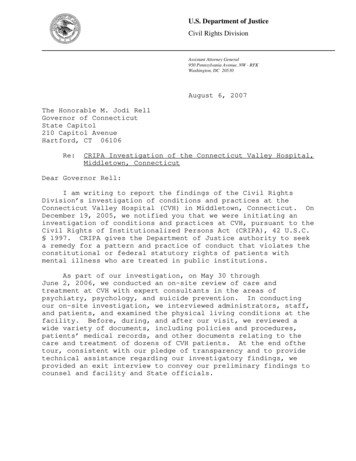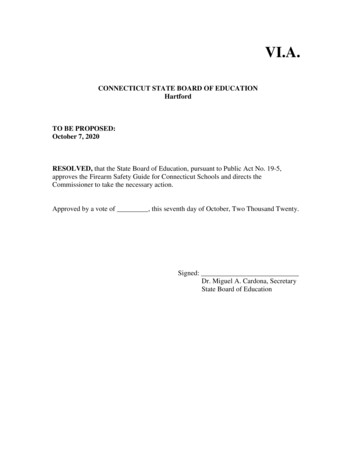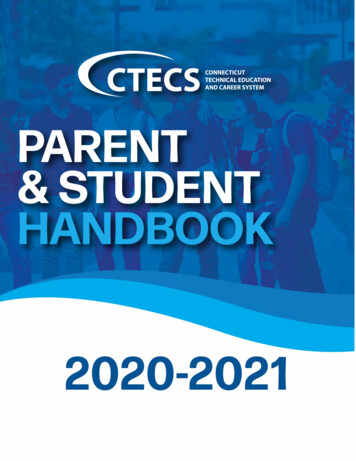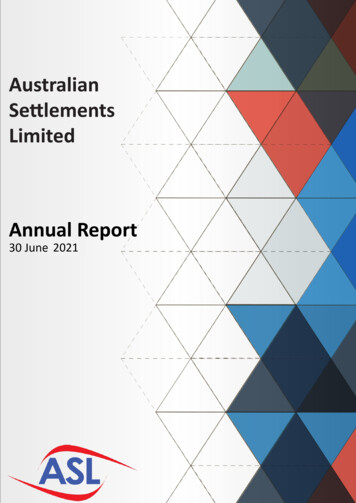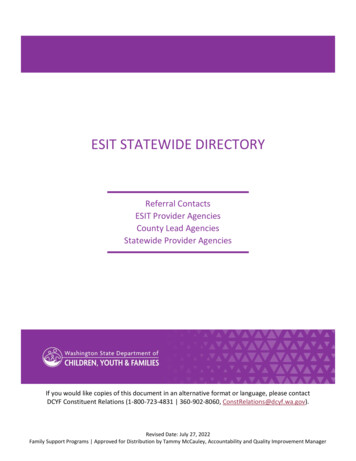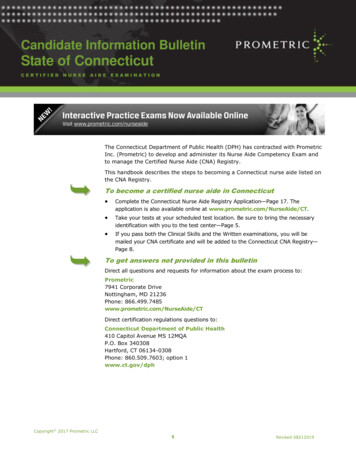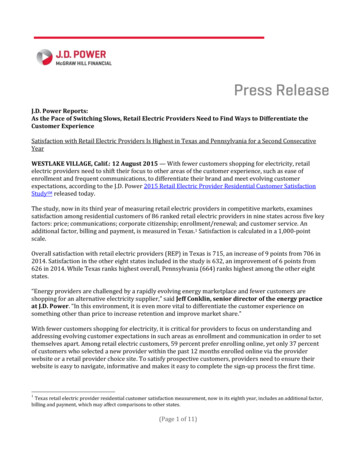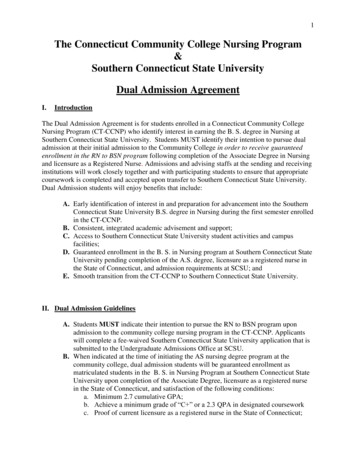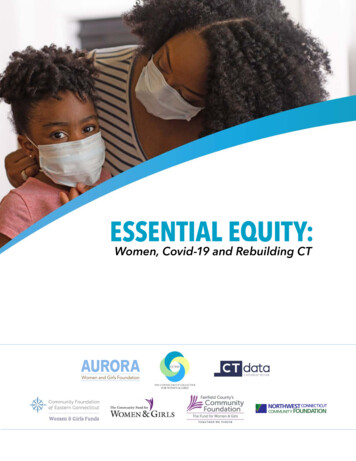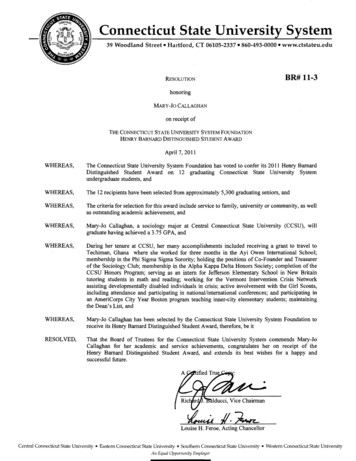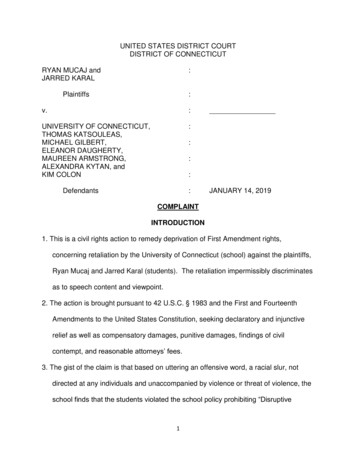
Transcription
UNITED STATES DISTRICT COURTDISTRICT OF CONNECTICUTRYAN MUCAJ andJARRED KARAL:Plaintiffs:v.:UNIVERSITY OF CONNECTICUT,THOMAS KATSOULEAS,MICHAEL GILBERT,ELEANOR DAUGHERTY,MAUREEN ARMSTRONG,ALEXANDRA KYTAN, andKIM COLON::::Defendants:JANUARY 14, 2019COMPLAINTINTRODUCTION1. This is a civil rights action to remedy deprivation of First Amendment rights,concerning retaliation by the University of Connecticut (school) against the plaintiffs,Ryan Mucaj and Jarred Karal (students). The retaliation impermissibly discriminatesas to speech content and viewpoint.2. The action is brought pursuant to 42 U.S.C. § 1983 and the First and FourteenthAmendments to the United States Constitution, seeking declaratory and injunctiverelief as well as compensatory damages, punitive damages, findings of civilcontempt, and reasonable attorneys’ fees.3. The gist of the claim is that based on uttering an offensive word, a racial slur, notdirected at any individuals and unaccompanied by violence or threat of violence, theschool finds that the students violated the school policy prohibiting “Disruptive1
Behavior.”4. The school finds that the recommended retaliatory sanction for the protected speechis, among other things, removal of the students from student housing, therebydepriving them of their physical welfare, contractual rights with the school, andinhibiting their otherwise ready access to the school environment.5. The school’s actions not only violate the First Amendment, but also violate the courtorder and consent decree in Nina Wu v. University of Connecticut, CV H-89-649(PCD) (January 25, 1990)1 (hereinafter “the consent decree”), a copy of which isattached, which is the basis of the contempt findings sought.JURISDICTION AND VENUE6. Jurisdiction rests on 28 U.S.C. §§ 1331 and 1343 as a matter of federal questionjurisdiction and to redress the deprivation of a federal right.7. This Court retains continuing jurisdiction to enforce the consent decree as a judgmentof this Court.8. The students have standing to enforce the consent decree as intended beneficiariesof the consent decree, being “any other student” of the school, identified in ¶1 of theconsent decree.9. This Court is vested with the authority to grant the requested declaratory judgmentpursuant to 28 U.S.C. §§ 2201 and 2202, as well as Federal Rule of Civil Procedure57.10. This Court is authorized to issue the requested injunctive relief and money damagespursuant to 42 U.S.C. § 1983 and Federal Rules of Civil Procedure 65 and 69.1It appears that the handwritten docket number is 16.2
11. This Court is authorized to issue the requested relief of reasonable attorneys’ feespursuant to 42 U.S.C. § 1988.12. Venue is proper in the United States District Court for the District of Connecticutpursuant to 28 U.S.C. § 1391(b), being that the events giving rise to the claimoccurred within the district.PARTIES13. Plaintiff Ryan Mucaj is a senior at the University of Connecticut and lives on-campusin Storrs, Connecticut, while school is in session.14. Plaintiff Jarred Karal is a senior at the University of Connecticut and lives oncampus in Storrs, Connecticut, while school is in session.15. Defendant University of Connecticut is an agency of the State of Connecticut, withits principal campus located in Storrs, Connecticut.16. Defendant Dr. Thomas Katsouleas is President of the school. He is sued in hisofficial capacity only.17. Defendant Dr. Michael Gilbert is Vice President for Student Affairs of the school.Student Affairs is the division of the school responsible for punishing the students.He is sued in his official capacity only.18. Defendant Eleanor JB Daugherty is Associate Vice President for Student Affairs andDean of Students of the school. She is sued in her individual and official capacities.19. Defendant Maureen Armstrong is Associate Dean of Students and Director of theDean of Students Office of the school. She is sued in her individual and officialcapacities.20. Defendant Alexandra Kytan is Assistant Director of Community Standards of the3
school as well as a Student Conduct Officer who investigated the students,concluded the students violated school policy, and recommends the removal of thestudents from student housing, among other things. She is sued in her individualand official capacities.21. Defendant Kim Colon is Assistant Director of Community Standards of the school aswell as a Student Conduct Officer who investigated the students. She conducted theinvestigative interview of student Karal.BACKGROUNDJanuary, 1990 Consent Decree22. On information and belief, in early 1989, Nina Wu was a junior at the University ofConnecticut.23. On information and belief, at about that time, Ms. Wu hung a handmade poster onher dormitory room door. The poster listed the types of people who were “welcome,”“tolerated.” “unwelcome,” and “shot on sight.”24. On information and belief, the latter category listed “bimbos,” “preppies,” “racists,”and “homos.”25. On information and belief, the school found that Ms. Wu violated the schoolharassment policy by way of the poster. Based on the use of the word “homos,” theschool expelled Ms. Wu from all residential and dining halls in April, 1989.26. On information and belief, Ms. Wu subsequently brought an action in federal DistrictCourt, District of Connecticut, pursuant to 42 U.S.C. § 1983, alleging deprivation ofher First Amendment rights. Although she denied writing the word “homos,” sheasked the court to assume that she did.4
27. On January 25, 1990, the court, the Honorable Peter C. Dorsey, District Judge,entered judgment in accordance with the consent decree.28. Pursuant to that consent decree, the school agreed to be permanently enjoined fromenforcing the school harassment policy employed against Ms. Wu, as that policyexisted at the time. Specifically, the school agreed to excise the prohibition in thepolicy concerning “making personal slurs or epithets based on race . . . .”(Emphasis added.)29. In its place, the school adopted a policy prohibiting the “face-to-face” use of “fightingwords,” in accordance with that legal doctrine.30. The school furthermore agreed to be permanently enjoined from “enforcing . . .any other policy that interferes with the exercise of First Amendment rights bythe plaintiff or any other student, when the exercise of such rights isunaccompanied by violence or the imminent threat of violence.” (Emphasisadded.)31. The school also agreed to provide Ms. Wu with a dormitory room, to restore herdining privileges, and to pay Ms. Wu reasonable attorneys’ fees.32. On information and belief, for between five and thirty years, the school and itsofficials and employees have disregarded their obligations under the consentdecree, and has failed to take any reasonable precautions to ensure the order isfollowed or even that successive officials are made aware of its existence.33. On information and belief, notwithstanding being repeatedly reminded of itsobligations under the consent decree, the school and its officials and employeescontinue to disregard their obligations under the consent decree, and fail to take any5
reasonable precautions to ensure the order is followed.January, 2015 Letter34. On January 26, 2015, the American Civil Liberties Union of Connecticut (ACLU-CT)sent a letter to the school, by way of the Office of President Susan Herbst. TheOffice of the President received, read, and evaluated the letter.35. The letter expressed concerns over how the University’s then-existing PolicyAgainst Discrimination and Policy Statement on Harassment improperly threatenedFirst Amendment rights.36. Among other things, the letter specifically reminds the school, with case law cited insupport, that “[i]t is well settled that expression cannot be forbidden merely becauseit offends.”37. The letter furthermore reminds the school of its obligations pursuant to theconsent decree, with case law cited in support.Fall 2019, Employing University Police to Punish Offensive Speech38. On October 11, 2019, Defendant Daugherty viewed an October 11, 2019 video thatshowed the plaintiffs’ walking through a parking lot, late at night. A student emailedto her an internet link to the video.39. The video appears to be captured from an apartment window using a cell phone. Itappears to depict three inebriated college students playing a word game involvingvarious taboo or offensive words.40. On information and belief, Defendant Daugherty believed she heard the defendantsutter the word “nigger” in the video.41. On information and belief, that utterance is inaudible or indiscernible at normal6
volume—the utterance was only audible or discernible using a feature to highlyamplify the recording.42. On information and belief, Defendant Daugherty reported what she viewed to theUniversity of Connecticut Police Department because she found the utteranceoffensive and believed others did as well.43. On information and belief, Defendant Daugherty knew that commensurate with, andbecause of, her position in the school that the police would investigate and disruptthe lawful conduct of the speakers, and this caused the speakers great distress anddisrupting their lawful activity.44. On information and belief, Defendant Daugherty used the police and used heruniversity position, acting under color of law, as an instrumentality to sanctionprotected speech.45. On information and belief, Defendant Daugherty understood that such retaliatoryinvocation of police would chill protected speech, as to the plaintiffs and as to otherstudents at the school.Fall 2019 Hearings46. Starting in October, 2019, the school commenced disciplinary processes against thestudents.47. The processes began with a series of investigative hearings, styled as “meetings,”with student Ryan Mucaj and student Karal, each independently, conducted byConduct Officer Kytan.48. On information and belief, the purpose of these hearings and the process of whichthey were a part was to investigate and sanction the students for their speech on7
October 11, 2019, offensive but protected.49. In addition, at about this time, Karal was subject to an investigation by the NursingSchool at University of Connecticut, alleging that his speech violated professionalstandards for him as a nursing student, because of the content of his speech onOctober 11, 201950. These investigations, distinct from any possible sanctions, alone violate the consentdecree and burden the plaintiffs’ speech, as “enforcing . . . [a] policy that interfereswith the exercise of First Amendment rights by . . . [a] student, when the exercise ofsuch rights is unaccompanied by violence or the imminent threat of violence.”51. On October 23, 2019, Conduct Officer Kytan had the first such hearing with Karal.52. On October 25, 2019, Conduct Officer Kytan had the first such hearing with Mucaj.53. These first hearings informed the students of the process and general nature of theaccusations against them.54. In the October 25, 2019 hearing, Mucaj asked conduct officer Kytan if Mucaj wasbeing investigated “because of something I said,” and Kytan responded, “Yes.”55. At the conclusion of this meeting, Conduct Officer Kytan was apprised by thestudent and through counsel that the schools conduct was violative of Mucaj’s rightsand should be immediately enjoined.56. During the meetings, it was made clear to both students that they were beinginvestigated because of a claim that they uttered offensive language on October 11,2019.57. On November 1, 2019, Conduct Officer Kytan conducted a factfinding hearing ofMucaj, with Mucaj present.8
58. On November 4, 2019, Conduct Officer Colon conducted a factfinding hearing ofKaral, with Karal present.59. Among other things, Conduct Officer Colon asked Karal whether which word heused, to clarify whether the utterance was a word that is spelled “n-i-g-g-a’” orwhether the utterance was a word that is spelled “n-i-g-g-e-r.”60. It was otherwise made clear to the students in these meetings that the school’sinterest and concern was in the content or viewpoint of the students’ speech.61. On November 13, 2019, Karal was subjected to an investigative hearing by thenursing school.62. During this meeting, Nursing School Officials made it explicitly clear to Karal that hewas being investigated for the content of his speech on October 11, 2019, and thathe was accused of violating professional standards based on the content of hisspeech, although ultimately the Nursing School declined to substantively continuethe investigation past that initial investigative interview.63. In correspondence and in internal records, Conduct Officer Kytan describes theinvestigation as concerning “remarks directed towards race/ethnicity.”64. On November 19, 2019, Conduct Officer Kytan detailed her findings to Mucaj.65. On November 20, 2019, Conduct Officer Kytan detailed her findings to Karal.66. The findings in both instances were essentially identical.67. Conduct Officer Kytan, in combination with Conduct Officer Colon and the directinvolvement of their supervisor Defendant Armstrong, concluded that based on theirinvestigation, the students violated school policy.68. These individuals and officials found that the students violated University of9
Connecticut's Responsibilities of Community Life: The Student Code (Part III B.),because of the content of what the students said on October 11, 2019.69. Specifically, these individuals “found” that the students violated a policy worded asfollows:Disruptive behavior, which is defined as participating in or inciting othersto participate in the disruption or obstruction of any University activity,including, but not limited to: teaching, research, events, administration,student conduct proceedings, the living/learning environment, or otherUniversity activities, on or off-campus; or of other non-University activitieswhen the conduct occurs on University premises; or of the livingenvironment, on or off-campus.70. Conduct Officer Kytan found and explained, that among other things, herrecommended sanction was to terminate the students’ housing agreement with theschool.71. Conduct Officer Kytan explained that the students could acquiesce and accept herfinding or challenge her finding by way of another hearing.72. Conduct Officer Kytan explained that at the end of that hearing, any discipline wouldgo into effect immediately.73. Conduct Officer Kytan further explained that if the panel upheld her finding, thestudents would have to vacate their on-campus homes within 24 hours.74. At no point in any of the proceedings was either student accused of acting withviolence or the imminent threat of violence, or any misconduct even remotelyapproaching such. The school has only ever accused the students of acting orallyand verbally.75. At the conclusion of the November 20, 2019, Conduct Officer Kytan indicated thatshe had not consulted with counsel prior to making her findings.10
76. At the conclusion of the November 20, 2019, the undersigned presented ConductOfficer Kytan with a November 20, 2019 letter demanding the proceedingsimmediately stop. She was directed in writing and orally to consult with counsel.77. Among other things, the letter explicitly reminded Conduct Officer Kytan of herpersonal and official obligations to honor the order of this Court in Nina Wu v.University of Connecticut.78. At about that time, a copy of the letter was sent to all named defendants, amongothers.79. Nonetheless, the school continues to the present day with “enforcing . . . [a] policythat interferes with the exercise of First Amendment rights by . . . [a] student, whenthe exercise of such rights is unaccompanied by violence or imminent threat ofviolence,” in direct derogation of paragraph 1 of the consent decree.80. On information and belief, in making the finding and sanction, neither ConductOfficer Kytan, nor Conduct Officer Colon, nor Defendant Armstrong, accounted forthe plaintiffs’ First Amendment interests.Sanction—Imminent Harm81. On January 8, 2020, the school informed the students’ that a hearing would beconducted on January 17, 2020, in accordance with what Conduct Officer Kytanstated on November 19 & 20, 2019.82. On information and belief, none of the hearing officers in the January 17, 2020 areexpected to have particular expertise or training in First Amendment issues.83. The finding and recommended sanction violate the consent decree and burden theplaintiffs’ speech.11
84. The continued enforcement of School Policy alleging the students’ speechconstituted Disruptive Behavior violates the consent decree and burden the plaintiffs’speech.85. Since the November 20, 2019 letter, the school has confirmed in writing thatnotwithstanding the present lawsuit, and notwithstanding the consent decree, theschool will enforce the policy against the students.86. The school has indicated it will not stop these disciplinary proceedings without aspecific Court Order directing it to do so.87. The students presently have the right to live on campus. Accordingly, removal ofthe students from student housing, deprives them of their physical welfare,contractual rights with the school, and inhibits their otherwise ready access to theschool environment.88. In light of the finding and recommended sanction, in light of the fact that none of thehearing officers have any expertise in First Amendment matters, the plaintiffs shallsuffer IMMINENT HARM and are likely to suffer further IMMINENT HARM unlessthis Court specifically enjoins the school from proceeding with the hearing andspecifically enjoining the school from implementing the recommended sanction orany other sanction whatsoever based on these proceedings.89. The harm is irreparable, as it affects both where the students’ live as well as theirability to associate with and benefit from the school environment during their finalsenior semester of college.12
COUNT ONE – DEPRIVATION OF SPEECH RIGHTSUNIVERSITY OF CONNECTICUT ANDALL DEFENDANTS IN THEIR OFFICIAL CAPACITY90. All preceding paragraphs are incorporated by reference.91. The school’s conduct violates the order and consent decree, which is clear, and theschool does so without fair ground as to doubt the wrongfulness of the conduct of itsofficials or employees.92. The Disruptive Behavior policy is an unconstitutional abridgement on its face, andas-applied or threatened to be applied, of the plaintiffs’ rights to the freedom ofspeech under the United States Constitution, First and Fourteenth Amendments.93. The Disruptive Behavior policy, as implemented and as written, is a de facto priorrestraint, affording university officials essentially freewheeling and standardlessdiscretion over speech as to content and viewpoint, as officials deem what speechfalls within the policy and is impermissible. Such a prior restraint violates thefreedom of speech.94. The Disruptive Behavior policy is unconstitutionally overbroad, unlawfully restrictingspeech.95. The Disruptive Behavior policy as-applied or threatened to be applied, is a contentbased and viewpoint-based restriction on speech.96. The Disruptive Behavior policy as-applied or threatened to be applied, is neithernarrowly tailored nor the least speech restrictive means to accomplish anypermissible government purpose sought.97. The Disruptive Behavior policy fails to adequately advise, notify, or inform personsthreated with prosecution for violating it. Accordingly, the policy is unconstitutionally13
vague, on its face and as-applied or threatened to be applied, under the UnitedStates Constitution, First and Fourteenth Amendments.98. The Disruptive Behavior policy, as-applied or threatened to be applied, violates theEqual Protection Clause of the Fourteenth Amendment and the First Amendment tothe United States Constitution through impermissible viewpoint discrimination basedon race or ethnicity.99. The Disruptive Behavior policy constitutes an express policy that causes aconstitutional deprivation by its mere existence, chilling speech, and also whenenforced.100. The habitual or deliberate disregard of the consent decree and its objectives is awidespread practice that is so permanent and well-settled that it constitutes acustom or practice.101. On information and belief, Defendant Daugherty is a person with final policymakingauthority as, among other things, Dean of Students.102. As described above, the school officials acted, are acting, and threaten to actunder color of state law to deprive the plaintiffs of their rights to the freedom ofspeech under the United States Constitution, First and Fourteenth Amendments.COUNT TWO – DEPRIVATION OF FIRST AMENDMENT RIGHTSDEFENDANT DAUGHERTY AS AN INDIVIDUAL103. Paragraphs 1–89 are incorporated by reference.104. By way of her personal conduct as described above, in employing police tosanction and punish protected speech and to harass the plaintiffs, and by way of herauthority as a government official, Dean of Students to the University of Connecticut,Defendant Daugherty acted under color of state law to deprive the plaintiffs of their14
rights to the freedom of speech under the United States Constitution, First andFourteenth Amendments.105. By way of her personal conduct as described above, in employing police in thisway, Defendant Daugherty effected an informal prior restraint scheme, chilling anddeterring protected speech, and thereby acted under color of state law to deprive theplaintiffs of their rights to the freedom of speech under the United StatesConstitution, First and Fourteenth Amendments.106. Defendant Daugherty’s conduct violates the order and consent decree, which isclear, and she does so without fair ground as to doubt the wrongfulness of herconduct.COUNT THREE – DEPRIVATION OF FIRST AMENDMENT RIGHTSDEFENDANT ARMSTRONG AS AN INDIVIDUAL107. Paragraphs 1–89 are incorporated by reference.108. By way of her personal conduct as described above, in working in combination withConduct Officer Kytan or Colon or both, both directing Kytan and Colon and advisingthem on how to act, Defendant Armstrong acted under color of state law to deprivethe plaintiffs of their rights to the freedom of speech under the United StatesConstitution, First and Fourteenth Amendments.109. Defendant Armstrong’s conduct violates the order and consent decree, which isclear, and she does so without fair ground as to doubt the wrongfulness of herconduct.COUNT FOUR – DEPRIVATION OF FIRST AMENDMENT RIGHTSDEFENDANT KYTAN AS AN INDIVIDUAL110. Paragraphs 1–89 are incorporated by reference.15
111. By way of her personal conduct as described above, Conduct Officer Kytan actedunder color of state law to deprive the plaintiffs of their rights to the freedom ofspeech under the United States Constitution, First and Fourteenth Amendments.112. Conduct Officer Kytan’s conduct violates the order and consent decree, which isclear, and she does so without fair ground as to doubt the wrongfulness of herconduct.COUNT FIVE – DEPRIVATION OF FIRST AMENDMENT RIGHTSDEFENDANT COLON AS AN INDIVIDUAL113. Paragraphs 1–89 are incorporated by reference.114. By way of her personal conduct as described above, in working in combination withConduct Officer Kytan or Defendant Armstrong or both, Conduct Officer Colon actedunder color of state law to deprive the plaintiffs of their rights to the freedom ofspeech under the United States Constitution, First and Fourteenth Amendments.115. Conduct Officer Colon’s conduct violates the order and consent decree, which isclear, and she does so without fair ground as to doubt the wrongfulness of herconduct.PRAYER FOR RELIEF116. The plaintiffs request that the court grant injunctive and declaratory relief,compensatory damages as to all defendants, punitive damages as to individualdefendants, pre and post judgment interest as allowed by law, reasonable attorneys’fees, findings of civil contempt as to each defendant, and such other relief as theCourt deems just and proper.THE PLAINTIFFS16
BY:/s/ Mario Cerame ct30125Mario CerameBrignole, Bush & Lewis LLC73 Wadsworth StreetHartford, Connecticut 06106T: 860.527.9973F: 860.527.5929E: mario@brignole.comattorneys@brignole.com17
ATTACHMENTJUDMENT AND CONSENT DECREENina Wu v. University of Connecticut ,CV H-89-649 (PCD) (January 25, 1990)
! ’f/: / *.-UNITED STATES DISTRICT COURT( ;FILEDDISTRICT OF CONNECTICUT(M 25 5 C2 Ffi '90CU R*U.S. DJ S T "‘)NINA WU")))vs.UNIVERSITY OF CONNECTICUT,ET AL. -HARTFC S UCIVIL H-89-649 PCD)J U D G HEN T-The parties in the above captioned matter havingstipulated that judgment may enter in accordance with the termsand conditions of the Proposed Consent Decree, and the Courthaving approved said stipulation on January 24, 1990,It is therefore ORDERED and ADJUDGED that judgment be and'is hereby entered in accordance with the terms and conditions of8/.the Proposed Consent Decree,Dated at Hartford, Connecticut, this 25th day of January.1990KEVIN F.By./.AO 72 A-ri %Dennis P. IavaroneDeputy in Charge
r \' lr-n-\* i L'jv*"-/tUNITED STATES DISTRICT COURTDISTRICT OF CONNECTICUTNINA WUfPlaintiff ,VS.LUNIVERSITY OF CONNECTICUT,ET ALS.Defendants.))))))}))))5)-NO. H89 649 (PCD)January 19 , 1990PROPOSED CONSENT DECREEAfter extensive and voluntary negotiation, the parties agree !to resolve all issues and claims raised and contained in the‘plaintiff's Application for Temporary Injunction and Complainton file herein.Accordingly, the parties consent to the 'following terms and conditions relative to the same and further
((agree that their respective officials, agents and successors willlikewise be bound.Itis further agreed that no term or condition of thisconsent decree may be adjusted or otherwise modified absentfuture order of this Court upon application of a party showinggood cause for such modification and after due notice to allcounsel of record.Absent such further modification, the terms and conditionstof this consent decree have the full force and effect of an orderof this Court. As such, any claims of a violation of the consentdecree on the part of any party hereto may be brought to thisCourt by any party and the Court shall make such further orderand grant such additional relief as it deems necessary andappropriate.1.The parties agree to the entry of a Judgment, providingthat the defendant University is permanently enjoined from enforcing Article VII(4) of its Student Conduct Code, as itexisted on October 24, 1989, or any other policy thatinterferes with the exercise of First Amendment rights by the2(i
i(plaintiff or any other student, when the exercise of such rightsis unaccompanied by violence or the imminent threat of violence.2.The parties represent that the aforementioned provision(Article VII ( 4 )) of the defendant University's StudentConduct Code has been revised and a copy of said revision isattached hereto as Exhibit A.t3.The defendant University will provide the plaintiff witha dormitory room and restore her to the rights and privileges- of(other dormitory residents, including dining privileges ,commencing with the spring, 1990 semester.The plaintiffwill be subject to the same rules and regulations as otherdormitory residents.4.The parties agree that no reference will be made to theincident that formed the basis of this action on theplaintiff ’s academic transcript.!!3(%
\\l\ri5.The parties agree that the plaintiff is entitled to areasonable attorneys fee, pursuant to 42 U.S.C.§ 1988, whichthe parties intend to negotiate without intervention by theCourt. In the event that the parties cannot reachagreement,the plaintiff reserves the right to make an application toCourt for a fee award; however, no such applicationshall befiled later than February 5, 1990.tTHE PLAINTIFF,FOR THE DEFENDANTS,BY HER ATTORNEYCLARINE NARDI RIDDLEATTORNEY GENERAL/ /21U.Karen Lee*'— .By:A.Torre, EsqWilliams and Wise51 Elm StreetPaul M. ShapiroAsst. Atty. GeneralUniv. of Conn.U-177605 Gilbert RoadStorrs, CT- 0 69( 203 ) 48 - 424FcmSuite 409New Haven, CT 06510( 203 ) 562 9931- roJCL'5A P P R 0 V E DPeter/C. DorseyAUnited States District Judge? y /ip(j1d34'V.*
'Etth.A-;Article VII (4) of the Student Conduct Code is amended tOj raaci a&sfollows (deletions in brackets; new language underlined'}:I(4.tj:!tkHarassment and/or IntimidationConductcausing alarm , or recklessly creating a riskby:threatening to commit crimes againstpersons or their property; [exhibiting,distributing, posting, or advertising g persons; using, in a public place,abusive or obscene language or making obscenegestures;] making unwelcome[d] sexual advancesor requests for sexual favors.[makingpersonal slurs or epithets based on race, sex,ethnic origin, disability, religion or sexualorientation] This also covers harassment ofpersons involved in aintimidation ofUniversity disciplinary hearing and of personsin authority who are in the process ofdischarging their responsibilities.The face to face use of ’" fighting words" by studentsharass any persons(s on university property or oh: otherproperty to which the Student Conduct Code applies isprohibited ."Fighting words” are those personallyabusive epithets which , when directly addressed to anvordinary person are , in the context used and as a matterof common knowledge , inherently likely to provoke animmediate violent reaction. whether or not they actuallydo so. Such words include , but are not limited to. thoseterms widely recognized to be derogatory references torace , ethnicity , religion , sex , sexual orientation ,disability , and other personal characteristics. f \ . %
School at University of Connecticut, alleging that his speech violated professional standards for him as a nursing student, because of the content of his speech on October 11, 2019
